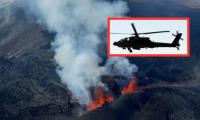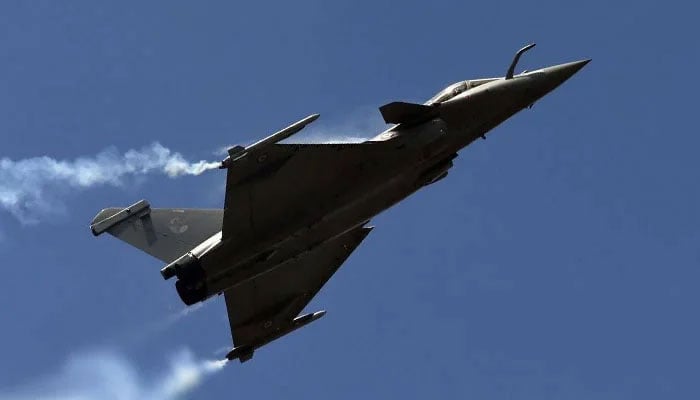From Rafale to ruin: How our military’s faith crushed billion-dollar Indian defence
First missile was fired under cry of Allah Hu Akbar, a spiritual war slogan echoing the spirit of historic Islamic battles
ISLAMABAD: In a meticulously coordinated operation approved at the highest level of civil and military leadership, Pakistan launched in the early hours on Saturday a decisive strike that penetrated India’s most advanced defence systems.
Behind the precision and planning was an extraordinary blend of strategy and spiritual conviction -- beginning with a long Dua (prayer) led by Army Chief General Asim Munir.
Sources said that the meeting, chaired by Prime Minister Shehbaz Sharif, on Friday night gave the green light for a retaliatory operation that would not only shake the defence lines of the nuclear-armed India but also shatter its long-standing arrogance and resistance to dialogue with Pakistan.
As dawn broke and the call to Fajr echoed across the nation, Pakistan’s armed forces began their coordinated, multi-domain strike against India. Symbolically launched during the early morning hours in line with Islamic teachings, every step of the offensive was marked by faith, conviction, and discipline. The first missile was fired under the cry of Allah Hu Akbar, a spiritual war slogan echoing the spirit of historic Islamic battles.
Though India boasted state-of-the-art Rafale jets and its S-400 air defence system worth $1.5 billion, it was Pakistan’s defence forces’ training, discipline and most importantly the faith -- Emaan -- that turned the tables.
What many analysts across the border had once written off as Pakistan’s “less valued machines” proved lethal in execution. Missile strikes’ precision, tactical use of air power and drone deployments, and Pakistan’s jamming tools caught Indian defences offguard. Within hours, critical Indian military and defence infrastructure was neutralised, command centers silenced and radar systems blinded. The Indian defence was in a complete state of shock if not chaos.
But perhaps the most astonishing blow came from an unexpected front -- cyber warfare. The world’s leading IT exporter, India, faced what experts are now calling the most successful cyber intrusion in its history from Pakistan which was considered nowhere near New Delhi in this field. Pakistan crippled communication lines, air traffic systems, and digital defence controls of India. Most of its defence and official sites were also hacked. India also witnessed 70 percent power shutdown. It was simply unbelievable.
Analysts struggle to explain the scale of the success for Pakistan and the damage caused to India. Some whisper it was strategy. Others believe it was something more -- a latent divine hand. The Islamic spirit that ran through the heart of Pakistan’s military offensive was undeniable. From naming the operation to the coordination of the strikes, Islamic principles guided every move. Soldiers advanced with Allah Hu Akbar on their lips, and their hearts fueled by faith, not just firepower. The result. India, which was dismissive of calls for talks as well as the ceasefire, was compelled to agree to a ceasefire and enter negotiations. Years of stalemate dissolved within hours. The geopolitical landscape of South Asia has shifted and it was Pakistan defence forces’ conviction in “Emaan, Taqwa, Jehad Fi-Sabeelillah” that redrew the power balance in South Asia.
-
 Jelly Roll Reveals How Weight Loss Changed Him As A Dad: 'Whole Different Human'
Jelly Roll Reveals How Weight Loss Changed Him As A Dad: 'Whole Different Human' -
 Prince Harry Gets Emotional During Trial: Here's Why
Prince Harry Gets Emotional During Trial: Here's Why -
 Queen Camilla Supports Charity's Work On Cancer With Latest Visit
Queen Camilla Supports Charity's Work On Cancer With Latest Visit -
 Dove Cameron Opens Up About Her Latest Gig Alongside Avan Jogia
Dove Cameron Opens Up About Her Latest Gig Alongside Avan Jogia -
 Petition Against Blake Lively PGA Letter Gains Traction After Texts With Taylor Swift Revealed
Petition Against Blake Lively PGA Letter Gains Traction After Texts With Taylor Swift Revealed -
 Netflix Revises Warner Bros. Deal To $83 Billion: All-cash Offer
Netflix Revises Warner Bros. Deal To $83 Billion: All-cash Offer -
 Prince Harry Mentions Ex-girlfriend Chelsy Davy In UK Court
Prince Harry Mentions Ex-girlfriend Chelsy Davy In UK Court -
 David, Victoria Beckham 'quietly' Consulting Advisers After Brooklyn Remarks: 'Weighing Every Move'
David, Victoria Beckham 'quietly' Consulting Advisers After Brooklyn Remarks: 'Weighing Every Move' -
 Meta's New AI Team Delivered First Key Models
Meta's New AI Team Delivered First Key Models -
 Prince Harry Defends Friends In London Court
Prince Harry Defends Friends In London Court -
 AI May Replace Researchers Before Engineers Or Sales
AI May Replace Researchers Before Engineers Or Sales -
 Christina Haack Goes On Romantic Getaway: See With Whom
Christina Haack Goes On Romantic Getaway: See With Whom -
 Consumers Spend More On AI And Utility Apps Than Mobile Games: Report
Consumers Spend More On AI And Utility Apps Than Mobile Games: Report -
 Aircraft Tragedy: Missing Tourist Helicopter Found Near Japan Volcano Crater
Aircraft Tragedy: Missing Tourist Helicopter Found Near Japan Volcano Crater -
 Taylor Swift Lands In Trouble After Blake Lively Texts Unsealed
Taylor Swift Lands In Trouble After Blake Lively Texts Unsealed -
 'Prince Harry Sees A Lot Of Himself In Brooklyn Beckham'
'Prince Harry Sees A Lot Of Himself In Brooklyn Beckham'




